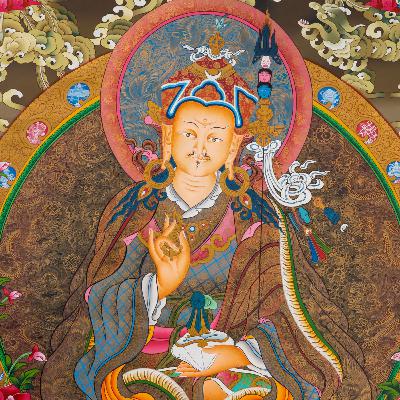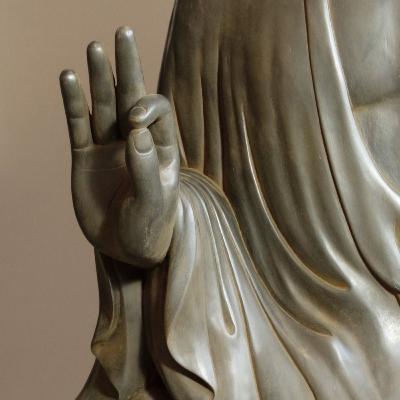Discover Wisdom of the Masters
Wisdom of the Masters

Wisdom of the Masters
Author: Samaneri Jayasara
Subscribed: 362Played: 28,006Subscribe
Share
© Samaneri Jayasara
Description
These podcasts are designed to provide listeners with teachings from great spiritual Masters & to create a meditative mood so that the meaning can go deep & enter your heart.
These podcasts are not monetized & are purely for educational & spiritual purposes.
If you enjoy & benefit from these recordings you are welcome to contribute to the daily running costs of our hermitage. Donations/gifts for this purpose can be made via PayPal using the link: https://paypal.me/VivekaHermitage
Find me on: https://vivekahermitage.com/
or YouTube: https://www.youtube.com/c/SamaneriJayasara/featured
These podcasts are not monetized & are purely for educational & spiritual purposes.
If you enjoy & benefit from these recordings you are welcome to contribute to the daily running costs of our hermitage. Donations/gifts for this purpose can be made via PayPal using the link: https://paypal.me/VivekaHermitage
Find me on: https://vivekahermitage.com/
or YouTube: https://www.youtube.com/c/SamaneriJayasara/featured
425 Episodes
Reverse
This is a spoken guided meditation (no music) that commences with an open awareness and listening - accepting and allowing things to 'be' - to come and to go. It then progresses to an investigation of the thinking process to see and understand its empty, substanceless nature. This insight brings freedom, relaxation and inner peace.🙏 May whatever goodness arises from these readings/offerings be for the benefit of all sentient beings.🔆 These podcasts are not monetized. If you benefit from these podcasts and would like to support our nun's hermitage, there are two options to donate - via Paypal using this email address: vivekahermitage@gmail.com with PayPal or using this direct link: https://paypal.me/VivekaHermitageor we have a WISE account with the above email address.
Text reading taken from:Treasures from Juniper Ridge (Padmasambhava's Advice #3) by Padmasambhava by Tulku Urgyen, Erik Pema Kunsang (Translator) , Marcia Binder Schmidt (Translator).Padmasambhava, also known as Guru Rinpoche (Precious Guru), was an Indian Vajrayana Buddhist master from the 8th century who introduced Tantric Buddhism to Tibet. He is considered the founder of the Nyingma school, the oldest tradition of Tibetan Buddhism, and is revered as the "Second Buddha" by his followers. He is believed to have come to Tibet at the invitation of King Trisong Detsen to help establish the first Tibetan Buddhist monastery, Samye Monastery.🙏 May whatever goodness arises from these readings/offerings be for the benefit of all sentient beings.🔆 These podcasts are not monetized. If you benefit from these podcasts and would like to support our nun's hermitage, there are two options to donate - via Paypal using this email address: vivekahermitage@gmail.com with PayPal or using this direct link: https://paypal.me/VivekaHermitageor we have a WISE account with the above email address.
A reading of excerpts from Margery Kempe's autobiography 'The Book of Margery Kempe.' A number of translations have been consulted to render the writing into modern English parlance.Margery Kempe (c. 1373 – after 1438) was an English Catholic mystic, known for writing through dictation The Book of Margery Kempe, a work considered by some to be the first autobiography in the English language. Her book chronicles her domestic tribulations, her extensive pilgrimages to holy sites in Europe and the Holy Land, as well as her mystical conversations with God. She is honoured in the Anglican Communion, but has not been canonised as a Catholic saint.Music: State Azure - Ethereal Landscapeshttps://stateazure.bandcamp.com/🙏 May whatever goodness arises from these readings/offerings be for the benefit of all sentient beings.🔆 These podcasts are not monetized. If you benefit from these podcasts and would like to support our nun's hermitage, there are two options to donate - via Paypal using this email address: vivekahermitage@gmail.com with PayPal or using this direct link: https://paypal.me/VivekaHermitageor we have a WISE account with the above email address.
A reading of two discources on the profound teaching of Dependent Origination (Paṭiccasamuppādasutta) as taught by the Buddha. These suttas have been taken from:Saṁyutta Nikāya (SN 12.2) - Paṭiccasamuppādasutta: Dependent OriginationTranslated by Bhikkhu BodhiSaṁyutta Nikāya (SN12.20) - ConditionsPaccayasutta - Translated by Bhikkhu Bodhi🙏 May whatever goodness arises from these readings/offerings be for the benefit of all sentient beings.🔆 These podcasts are not monetized. If you benefit from these podcasts and would like to support our nun's hermitage, there are two options to donate - via Paypal using this email address: vivekahermitage@gmail.com with PayPal or using this direct link: https://paypal.me/VivekaHermitageor we have a WISE account with the above email address.
Reading of excerpts from Dr Raghavan's essay 'The Eye of Self Existence'. The full text can be found here: https://theosophytrust.org/944-eye-of-self-existenceProfessor Raghavan N. Iyer (1930 -1995) was an internationally known philosopher, political theorist, and spiritual practitioner who devoted his life to the intellectual and spiritual uplift of human society. The only Rhodes Scholar from India in 1950 to Oxford, he secured First Class Honors in Philosophy, Politics and Economics and later earned a D. Phil. Degree in moral and political philosophy. For eight years, he was Fellow and Lecturer in Politics at St. Anthony's College, Oxford, then Visiting Professor at the Universities of Oslo, Ghana and Chicago, and lectured at the College of Europe in Belgium, the Erasmus Seminar in Holland, and at Harvard, Bowdoin, Berkeley, U.C.L.A., Rand Corporation and the California Institute of Technology. He was professor of political philosophy at the University of California, Santa Barbara for 21 years.His message is that a renewed humankind is now emerging, and his writings address the causes of the global situation, the nature of this evolution, and the manner in which individuals can participate fully in this collective transformation.Dr Iyer was a practitioner and member of the Theosophical Foundation and wrote that:"Initiation into Theosophical metaphysics is more than an intellectual or moral enterprise; it is a continuous spiritual exercise in the development of intuitive and cognitive capacities that are the highest available to humans, a process that includes from the first a blending of the head and the heart through the interaction of viveka and vairagya, discrimination and detachment. Even our initial apprehension of a statement of Theosophical metaphysics involves an ethical as well as mental effort, just as even the smallest application of a Theosophical injunction to our moral life requires some degree of mental control and the deeper awareness, universal and impersonal in nature, that comes from our higher cognitive capacities. Moral growth, for a Theosophist, presupposes “the silent worship of abstract or noumenal Nature, the only divine manifestation”, that is “the one ennobling religion of Humanity.”🙏 May whatever goodness arises from these readings/offerings be for the benefit of all sentient beings.🔆 These podcasts are not monetized. If you benefit from these podcasts and would like to support our nun's hermitage, there are two options to donate - via Paypal using this email address: vivekahermitage@gmail.com with PayPal or using this direct link: https://paypal.me/VivekaHermitageor we have a WISE account with the above email address.
A reading of verses on 'The Spirit of Wabi-sabi: Beauty in Imperfection' by Sen No Rikyu.Sen no Rikyū (1522 -1591), was a Japanese tea master considered the most important influence on the chanoyu, the Japanese "Way of Tea", particularly the tradition of wabi-cha. Rikyū’s life unfolded during a turbulent period in Japanese history—an age of warlords and shifting powers—but in the midst of that chaos, he cultivated a space of serenity. His teachings arose from Zen Buddhism and the profound silence of mindful observation. He once said, “In the small, seek the great.” This encapsulates the heart of his worldview: that in the smallest actions—the placing of a cup, the bow before pouring water, the sweeping of a path—there lies an opportunity for awakening.Central to Rikyū’s vision of life is the concept of wabi-sabi—the beauty of imperfection, impermanence, and incompleteness. He brought this aesthetic into the tea ceremony by simplifying and refining it until only the essential remained. He preferred rustic, handmade tea bowls with irregular shapes and muted colors over ornate Chinese porcelain. These objects, flawed yet harmonious, reminded participants of their own impermanence and the natural rhythm of life.Music: Swami Madhuram - 'Calm'With deep thanks to Swami for permission to use his beautiful music for this channelPlease find his music here: https://insighttimer.com/swamimadhuram🙏 May whatever goodness arises from these readings/offerings be for the benefit of all sentient beings.🔆 These podcasts are not monetized. If you benefit from these podcasts and would like to support our nun's hermitage, there are two options to donate - via Paypal using this email address: vivekahermitage@gmail.com with PayPal or using this direct link: https://paypal.me/VivekaHermitageor we have a WISE account with the above email address.
Selected excerpts of Ramana Maharshi's teaching taken from the text, Aham Sphurana. With thanks to John David for permission to read from this recently published text.https://www.amazon.com.au/Aham-Sphurana-Realisation-Selection-Teachings/dp/1916321178Ramana Maharshi ( 1879 -1950) was an Indian sage and jivanmukta (liberated being). He was born Venkataraman Iyer, but is mostly known by the name Bhagavan Sri Ramana Maharshi. He was born in Tiruchuli, Tamil Nadu, India. In 1895, an attraction to the sacred hill Arunachala and the 63 Nayanmars was aroused in him and in 1896, at the age of 16, he had a "death-experience" where he became aware of a "current" or "force" which he recognized as his true "I" or "Self".Music: Le Code - 'Ocean Shores'https://le-code.bandcamp.com/🙏 May whatever goodness arises from these readings/offerings be for the benefit of all sentient beings.🔆 These podcasts are not monetized. If you benefit from these podcasts and would like to support our nun's hermitage, there are two options to donate - via Paypal using this email address: vivekahermitage@gmail.com with PayPal or using this direct link: https://paypal.me/VivekaHermitageor we have a WISE account with the above email address.
A selection of pointers read from the text, 'Selfless Self: Talks with Shri Ramakant Maharaj'.Ramakant Maharaj (1941-2018) was a direct disciple of the late Sri Nisargadatta Maharaj and spent 19 years with him. From 1962, he visited Nisargadatta Maharaj and listened to his lectures regularly, until his master's Mahasamadhi in 1981. Ramakant was himseldf also an Indian spiritual teacher of Advaita, Nonduality, and a Guru, belonging to the Inchegiri branch of the Navnath Sampradaya. During the last decade or so at his ashram in Nashik, Ramakant Maharaj introduced devotees from around the world to the ultimate Truth.Music track: Gifted by 'Beebs' - Yohann Vincent🙏 May whatever goodness arises from these readings/offerings be for the benefit of all sentient beings.🔆 These podcasts are not monetized. If you benefit from these podcasts and would like to support our nun's hermitage, there are two options to donate - via Paypal using this email address: vivekahermitage@gmail.com with PayPal or using this direct link: https://paypal.me/VivekaHermitageor we have a WISE account with the above email address.
A reading of St Paul's first Letter (Chapter 13) to the Corinthians, the Christian community that he had founded at Corinth, Greece. In the year 55 C.E. while in Ephesus, Paul wrote this inspired letter, now known as 1 Corinthians. Among other things, he encouraged the Christians in Corinth to reject false teachings, to remain united, to shun immorality, and to strengthen their faith in the resurrection. Music: David Schombert - 'Lagoon'🙏 May whatever goodness arises from these readings/offerings be for the benefit of all sentient beings.🔆 These podcasts are not monetized. If you benefit from these podcasts and would like to support our nun's hermitage, there are two options to donate - via Paypal using this email address: vivekahermitage@gmail.com with PayPal or using this direct link: https://paypal.me/VivekaHermitageor we have a WISE account with the above email address.
This reading compiles excerpts from three different Dhamma talks (which were translated live), where Ajahn Dtun talks about the paths and fruits to full liberation (arahantship) and responds to questions. Only a few small grammatical adjustments have been made to allow for a smoother transition between sections.Ajahn Dtun is a highly respected Thai Buddhist monk and meditation master, known for his gentle demeanor and deep wisdom. He is a prominent figure within the Ajahn Chah tradition and is the Abbot of Wat Boonyawad in Chonburi, Thailand. Ajahn Dtun is recognized for his dedication to practice and the clarity of his teachings, which emphasize the importance of virtue, concentration, and wisdom in meditation._____________________________🙏 May whatever goodness arises from these readings/offerings be for the benefit of all sentient beings.
A selection of pith teachings on the nature of mind from various Khandros/Dakinis belong to the Bon Dzogchen tradition. These short teachings are found in the text, 'Heart Essence of the Khandro: Experiential Instructions on Bonpo Dzogchen - Thirty Signs and Meanings from Women Lineage-Holders ' - by Yongdzin Lopon Tenzin Namdak Rinpoche.🙏 May whatever goodness arises from these readings/offerings be for the benefit of all sentient beings.🔆 These podcasts are not monetized. If you benefit from these podcasts and would like to support our nun's hermitage, there are two options to donate - via Paypal using this email address: vivekahermitage@gmail.com with PayPal or using this direct link: https://paypal.me/VivekaHermitageor we have a WISE account with the above email address.
The Hsin Hsin Ming (Shinjinmei in Japanese) is a verse attributed to the Third Zen Patrriarch. Written in the 6th century, it is considered the first clear and comprehensive statement of Zen. The Hsin Hsin Ming has been much beloved by Zen practitioners for over a thousand years and is still studied today in Western Zen circles. The Hsin Hsin Ming emphasizes that the Great Way is not involved in the game of opposites, and that in order to understand the truth, we have to become aware of our choosing, discriminating mindsTranslation: An amalagam of various classic translationsMusic: Swami Madhuram - 'Coming Home'With deep thanks to Swami for permission to use his beautiful music for this channelPlease find his music here: https://timeforpeace.bandcamp.com/🙏 May whatever goodness arises from these readings/offerings be for the benefit of all sentient beings.🔆 These podcasts are not monetized. If you benefit from these podcasts and would like to support our nun's hermitage, there are two options to donate - via Paypal using this email address: vivekahermitage@gmail.com with PayPal or using this direct link: https://paypal.me/VivekaHermitageor we have a WISE account with the above email address.
The Ashtavakra Gita is a short treatise on Advaita Vedanta which systematically deals with the mystical experiences of the individual in their quest for truth, transcendental peace and bliss. It was composed before the common era, most likely between 500-400BC. Some scholars claim it was written later, either in the eighth century by a follower of Shankara, or as late as the fourteenth century during a resurgence of Shankara's teaching.The subtle philosophical truths are expounded in the form of a lucid dialogue between the teenager sage Ashtavakra and his royal disciple, the King-seer Janaka. To Ashtavakra, Self-knowledge through direct mystical intuition is the only goal to be reached and experienced in the dynamic silence of one’s own deepest meditation.Translated by Bart Marshall🙏 May whatever goodness arises from these readings/offerings be for the benefit of all sentient beings.🔆 These podcasts are not monetized. If you benefit from these podcasts and would like to support our nun's hermitage, there are two options to donate - via Paypal using this email address: vivekahermitage@gmail.com with PayPal or using this direct link: https://paypal.me/VivekaHermitageor we have a WISE account with the above email address.
The Ashtavakra Gita is a short treatise on Advaita Vedanta which systematically deals with the mystical experiences of the individual in their quest for truth, transcendental peace and bliss. It was composed before the common era, most likely between 500-400BC. Some scholars claim it was written later, either in the eighth century by a follower of Shankara, or as late as the fourteenth century during a resurgence of Shankara's teaching.The subtle philosophical truths are expounded in the form of a lucid dialogue between the teenager sage Ashtavakra and his royal disciple, the King-seer Janaka. To Ashtavakra, Self-knowledge through direct mystical intuition is the only goal to be reached and experienced in the dynamic silence of one’s own deepest meditation.Translated by Bart Marshall🙏 May whatever goodness arises from these readings/offerings be for the benefit of all sentient beings.🔆 These podcasts are not monetized. If you benefit from these podcasts and would like to support our nun's hermitage, there are two options to donate - via Paypal using this email address: vivekahermitage@gmail.com with PayPal or using this direct link: https://paypal.me/VivekaHermitageor we have a WISE account with the above email address.
The Great Tantra of Vajrasattva is a Root Tantra of the Space Section first translated into Tibetan in the 8th Century by Vairochana Rakshita, a famous translator during the early period of Buddhism in Tibet. This tantra is one of a handful of the earliest translations of Ati Yoga teachings into the Tibetan language, where they were preserved long after the originals disappeared in India, possibly during the Islamic invasions. Vairochana did not attribute these Ati Yoga source texts to himself, but rather to Garab Dorje, who was revered as a full emanation of Vajrasattva in human form. Vairochana’s translations stand on their own as jewels of Wisdom, the core teaching being always the same: the luminous, natural, non-dual mind of Great Perfection itself. Reading: excerpts from the full tantra. Compiled by Yeshe Donden (Roger Calverley) integrating various contemporary English translations. 🙏 May whatever goodness arises from these readings/offerings be for the benefit of all sentient beings.🔆 These podcasts are not monetized. If you benefit from these podcasts and would like to support our nun's hermitage, there are two options to donate - via Paypal using this email address: vivekahermitage@gmail.com with PayPal or using this direct link: https://paypal.me/VivekaHermitageor we have a WISE account with the above email address.
Chokgyur Dechen Zhikpo Lingpa (1829-1870) was born in Sangyel, at the base of the sacred mountain Namkhadzö in the province of Nangchen, Kham. He was a contemporary of and collaborator with the Dzogchen masters of the Rimé movement, Jamyang Khyentsé Wangpo and Jamgön Kongtrul. Chokgyur Lingpa was a tertön or "treasure revealer". Regarded as one of the major tertöns in Tibetan history, his termas are widely practiced by both the Kagyu and Nyingma schools. Chokgyur Lingpa was someone who the majority of masters accepted upon simply hearing his name and connecting with his teachings, without any dispute or effort of their own.🙏 May whatever goodness arises from these readings/offerings be for the benefit of all sentient beings.🔆 These podcasts are not monetized. If you benefit from these podcasts and would like to support our nun's hermitage, there are two options to donate - via Paypal using this email address: vivekahermitage@gmail.com with PayPal or using this direct link: https://paypal.me/VivekaHermitageor we have a WISE account with the above email address.
A reading of the ancient text, 'Thunder, Perfect Mind '- Voice of the Divine Feminine - using an amalgam of translations by George McCrae and Hal Taussig, et al.'Thunder, Perfect Mind' is the title of a coptic text that uses paradoxical language to describe a feminine divine figure who embodies both power and vulnerability, and who is present in all aspects of existence. The title itself, "Thunder, Perfect Mind," is a metaphorical description of this divine figure, highlighting her powerful voice (thunder) and her comprehensive, all-encompassing nature (perfect mind). It follows a poetic structure, and has received scholarly attention for its gnomic style and unclear subject. It speaks about the divine in paradoxical terms, as both honored and cursed, as life and death, and as both the cause of peace and war. The poem also emphasizes the idea that the divine exists both inside and outside of oneself, and that one's judgment and salvation are dependent on their relationship to the divine. It offers a unique perspective on the nature of the divine and the individual's relationship to it, and it highlights the idea of duality, non-duality, and the interconnectedness of opposing forces.🙏 May whatever goodness arises from these readings/offerings be for the benefit of all sentient beings.🔆 These podcasts are not monetized. If you benefit from these podcasts and would like to support our nun's hermitage, there are two options to donate - via Paypal using this email address: vivekahermitage@gmail.com with PayPal or using this direct link: https://paypal.me/VivekaHermitageor we have a WISE account with the above email address.
A reading of selected passages from the classic text, Zen Mind, Beginner's Mind by Shunrya Suzuki. This text, along with Philip Kapleau's The Three Pillars of Zen (1965), is one of the two most influential books on Zen in the West. Even today, many Zen meditation centers still use "Zen Mind, Beginner's Mind" as a teaching manual because it bridges Eastern Zen thought and Western modern life. This modern interpretation not only promoted the cross-cultural dissemination of Zen Buddhism, but also had a wide influence on fields such as educational theory and psychology.Shunryu Suzuki (1904-1971) was born into a family of Buddhist monks in Japan. He received spiritual education of the Soto School since childhood and served as the abbot of a temple during World War II. In 1959, he moved to San Francisco and discovered the growing interest of Americans in Zen Buddhism. In 1962, he founded the Old Jinshan Zen Center and subsequently established the Tassajara Zen Mountain Center, which was the first Buddhist temple outside Asia specifically for Western practitioners. Through his books and doctrines, Suzuki translated the complex Zen philosophy into a language that is easier for Western readers to understand.🙏 May whatever goodness arises from these readings/offerings be for the benefit of all sentient beings.🔆 These podcasts are not monetized. If you benefit from these podcasts and would like to support our nun's hermitage, there are two options to donate - via Paypal using this email address: vivekahermitage@gmail.com with PayPal or using this direct link: https://paypal.me/VivekaHermitageor we have a WISE account with the above email address.
These profound practice teachings on freeing the mind from being ruled by thought, as taught by Sri Ramana, were taken from various sources/texts.Ramana Maharshi ( 1879 -1950) was an Indian sage and jivanmukta (liberated being). He was born Venkataraman Iyer, but is mostly known by the name Bhagavan Sri Ramana Maharshi. He was born in Tiruchuli, Tamil Nadu, India. In 1895, an attraction to the sacred hill Arunachala and the 63 Nayanmars was aroused in him and in 1896, at the age of 16, he had a "death-experience" where he became aware of a "current" or "force" which he recognized as his true "I" or "Self".🙏 May whatever goodness arises from these readings/offerings be for the benefit of all sentient beings.🔆 These podcasts are not monetized. If you benefit from these podcasts and would like to support our nun's hermitage, there are two options to donate - via Paypal using this email address: vivekahermitage@gmail.com with PayPal or using this direct link: https://paypal.me/VivekaHermitageor we have a WISE account with the above email address.
A selection of passages from the text 'Revelations of Divine Love' by Julian of NorwichJulian of Norwich (1342-c 1416) was the most important English mystic of the 14th century. She wrote the best known surviving book in the English language written by a mystic, 'Revelations of Divine Love'. The book is the first written in English by a woman. Her spirituality is strongly Trinitarian and basically Neoplatonic. Through the Passion, Julian was led to visions of the Trinity and of the universe as it exists in God. She lived in permanent seclusion as an anchoress in her cell, which was attached to St Julian's Church, Norwich.🙏 May whatever goodness arises from these readings/offerings be for the benefit of all sentient beings.🔆 These podcasts are not monetized. If you benefit from these podcasts and would like to support our nun's hermitage, there are two options to donate - via Paypal using this email address: vivekahermitage@gmail.com with PayPal or using this direct link: https://paypal.me/VivekaHermitageor we have a WISE account with the above email address.
























Must listen category
My all time favorite.
,
💕
This was most enlightening. I am truly blessed by what you do. Many bows!
thanks 👍
keys! 🙏
🙏❤️
may you be happy 😊🙏❤️
thanks 🙏👍
🙏❤️
🙏❤️
in the flash
May you be liberated